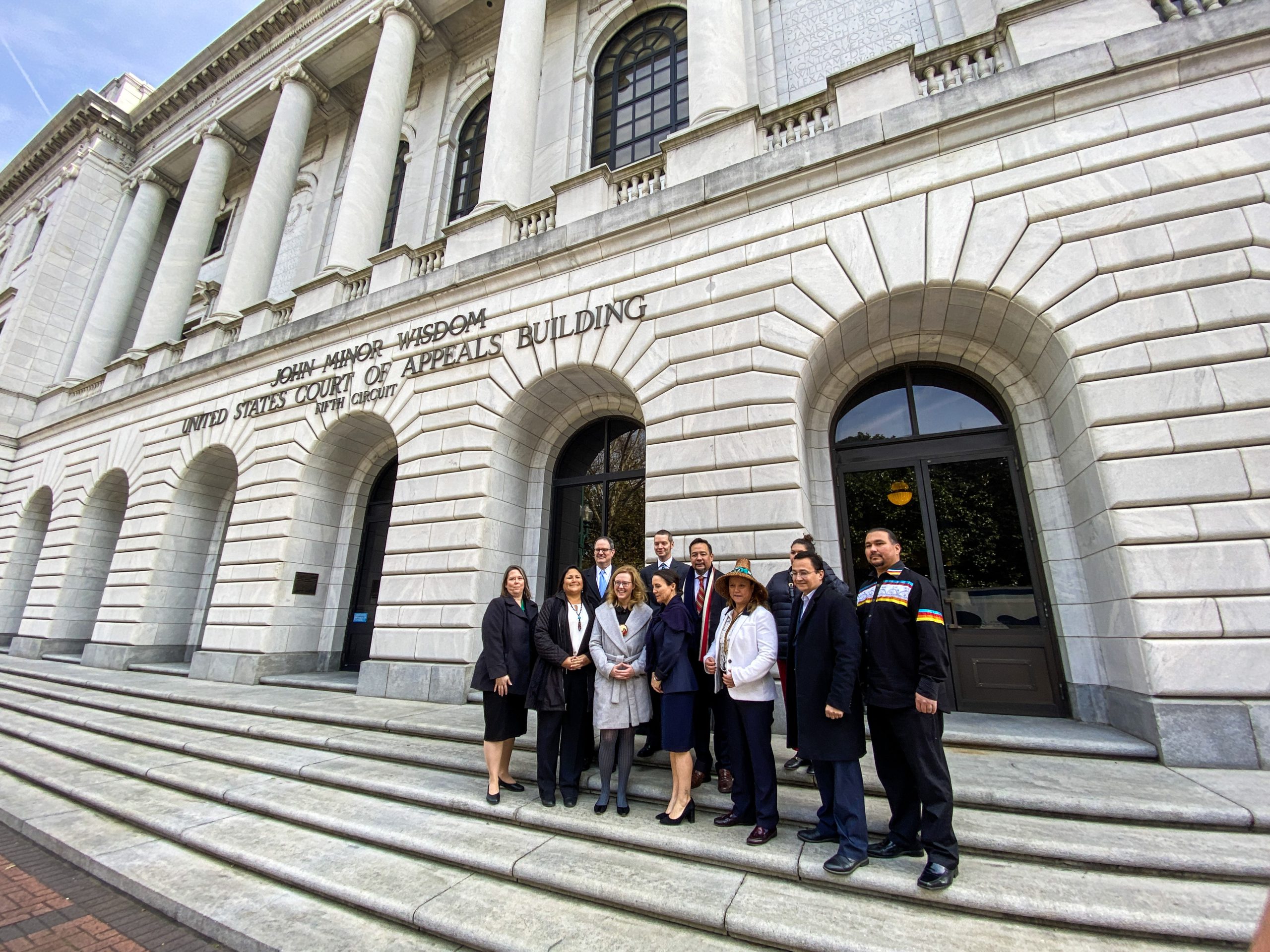Indianz.Com > News > Gaylord News: Indian Child Welfare Act in limbo amid high-stakes challenge
State statutes could protect families if Indian Child Welfare Act is overturned
Tuesday, January 4, 2022
Gaylord News
A Texas challenge to the federal Indian Child Welfare Act might not be entirely successful in at least nine states where state laws impose similar restrictions on the adoption of Indigenous children by non-Native parents, some experts say.
The Supreme Court has been asked to hear a challenge from a Texas couple who called the law unconstitutional after it delayed their adoption of a Navajo child they had been fostering. The law was meant to stop the removal of Native children from their culture, and the Texas couple was initially turned down after tribal leaders found a home on the Navajo Nation where the child could go.
The court has not yet said whether it will take the case, but Chrissi Nimmo, deputy attorney general for the Cherokee Nation, said state statutes can further protect Indigenous children and their families if the court ultimately finds the act unconstitutional. Arizona is not one of the nine states with comprehensive laws that might blunt any weakening of the federal act.
“I think you will see tribes starting to put more effort … to strengthen state ICWA laws as a way to protect Indian kids, their families and tribes,” Nimmo said.


One issue with the Indian Child Welfare Act is the lack of consequences for state agencies that aren’t compliant. “Who won custody in a lot of these cases really came down to who had more money and legal resources,” Nagle said. Connie Johnson, a former Oklahoma state senator from Holdenville, said she’ll be livid if the act is overturned. Johnson is a Black woman of Choctaw descent who is running for governor of Oklahoma. “I think it’s pretty arrogant for these families seeking to repeal ICWA to disregard indigenous culture and the importance of children growing up in their culture,” Johnson said. Nancy Marie Spears, a Gaylord News reporter based in Washington, is an enrolled member of the Cherokee Nation of Oklahoma. Gaylord News is a reporting project of the University of Oklahoma Gaylord College of Journalism and Mass Communication. For more stories from Gaylord News visit GaylordNews.net. For more stories from Cronkite News, visit cronkitenews.azpbs.org.Have you seen NICWA's Guide to Compliance with the Indian Child Welfare Act? This guide is designed to help individuals understand
— NICWA (@NativeChildren) October 5, 2021
ICWA’s requirements and is meant to be read in conjunction with the law. To find this resource on our website, visit https://t.co/fIyHqJS4qU pic.twitter.com/91XneAdxGB
5th Circuit Court of Appeals Decision En Banc
Brackeen v. Haaland [325 pages] (April 6, 2021)Per Curiam [Summary 7 pages] (April 6, 2021)
Judge James Dennis [Opinion 153 pages] (April 6, 2021)
Judge Stuart Kyle Duncan [Opinion 122 pages] (April 6, 2021)
Judge Priscilla R. Owen [Concurring in part/Dissenting in part 9 pages](April 6, 2021)
Judge Jacques L. Wiener, Jr. [Dissenting in part 8 pages] (April 6, 2021)
Judge Catharina Haynes [Concurring 2 pages] (April 6, 2021)
Judge Stephen A. Higginson [Concurring in Part 4 pages] (April 6, 2021)
Judge Gregg Costa [Concurring in part / Dissenting in part 20 pages] (April 6, 2021)
Prior 5th Circuit Court of Appeals Decision
Brackeen v.
Bernhardt (August 9, 2019) Brackeen v. Bernhardt Partial Dissent (August 16, 2019)
Note: This story originally appeared on Cronkite News. It is published via a Creative Commons license. Cronkite News is produced by the Walter Cronkite School of Journalism and Mass Communication at Arizona State University.
Related Stories
Freedom Socialist: Conservative attack on Indian Child Welfare Act continues (December 1, 2021)‘We have a lot of work to do’: Native community continues annual walk for lost children (November 26, 2021)
Supreme Court returns to in-person arguments as justice tests positive for COVID-19 (October 1, 2021)
Native America Calling: Federal protections for children under constant legal pressure (September 20, 2021)
Chuck Hoskin: Cherokee Nation takes child care seriously (May 10, 2021)
California Tribal Families Coalition responds to ICWA decision (April 8, 2021)
Indian Country Today: Decision on Indian Child Welfare Act ‘incredibly divisive’ (April 7, 2021)
Protect ICWA Campaign statement on ICWA decision (April 7, 2021)
Fifth Circuit Court of Appeals: Brackeen v. Haaland (April 7, 2021)
‘It takes our own people to help our own people’: Marchers honor lost Native children (November 27, 2020)
Photos: Memorial March to Honor Our Lost Children (November 27, 2020)
Crushing Colonialism: Colonizer theft of Indigenous children (November 17, 2020)
Indian Country Today: Fate of Indian Child Welfare Act up to federal courts (October 12, 2020)
Search
Filed Under
Tags
More Headlines
Cronkite News: Long COVID cases remain high in Arizona
Native America Calling: Eyes in the sky for development, public safety, and recreation
Native America Calling: Three new films offer diverse views of Native life
NAFOA: 5 Things You Need to Know this Week
Chuck Hoskin: Cherokee Nation works toward cure for arthritis
Native America Calling: Protecting young people from the down sides of social media
Cronkite News: Fake ‘shaman’ among candidates failing to make Congressional ballot
Native America Calling: New Native voices in poetry
Cronkite News: Tribes air concerns about border at hearing in nation’s capital
Native America Calling: Indiginerds descend on Oklahoma City
Native America Calling: Political leaders target tribes with unfounded claims
Cronkite News: First Native woman in space shares unique journey
Native America Calling: Tackling a troubling trend for Native women in prison
Chuck Hoskin: Cherokee Nation safeguards our Native language
Native America Calling: How will $1.5 billion in opioid settlement money help the populations hit the hardest?
More Headlines
Native America Calling: Eyes in the sky for development, public safety, and recreation
Native America Calling: Three new films offer diverse views of Native life
NAFOA: 5 Things You Need to Know this Week
Chuck Hoskin: Cherokee Nation works toward cure for arthritis
Native America Calling: Protecting young people from the down sides of social media
Cronkite News: Fake ‘shaman’ among candidates failing to make Congressional ballot
Native America Calling: New Native voices in poetry
Cronkite News: Tribes air concerns about border at hearing in nation’s capital
Native America Calling: Indiginerds descend on Oklahoma City
Native America Calling: Political leaders target tribes with unfounded claims
Cronkite News: First Native woman in space shares unique journey
Native America Calling: Tackling a troubling trend for Native women in prison
Chuck Hoskin: Cherokee Nation safeguards our Native language
Native America Calling: How will $1.5 billion in opioid settlement money help the populations hit the hardest?
More Headlines
